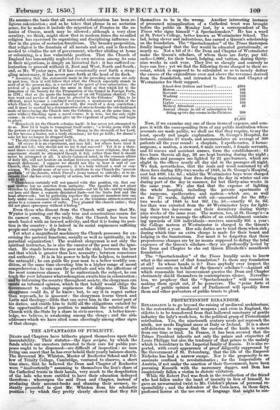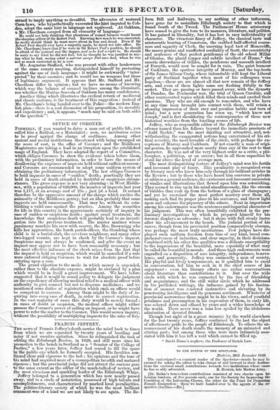PROTECTIONIST RIBANDISIL
RENAISSANCE is to go beyond the raising of mediseval architecture; to the restoration of mediwval weapons ; and even in England, the stiletto is to be transferred from that hallowed sanctuary of gentle industry the lady's work-box, to the political grasp of Protectionist retribution. Yes, the nineteenth century needs not reproach the ninth, nor needs -England sneer at Italy or Ireland. It is a sheer self-delusion to suppose that the custom of the knife is remote from our time or land. In France, it has been averred that the Prince President inherits not only the palace and etiquettes of Louis Philippe but also the tendency of that prince to the malady which is hereditary in the Imperial family of Russia. It is also re- ported, with every appearance of proof diligently suppressed by the Government of St. Petersburg, that the life of the Emperor Nicholas has had a narrow escape. Nor is the propensity to as- sassinate confined to revolutionaries ; for the Imperialists of Austria, if not under the sanction of their Government, have been pursuing Kossuth with the mercenary dagger, and Bern has suspiciously fallen a victim to dietetic visitation. While Sir Robert Peel was fresh in the recollection of the friend who had fallen under the hand of insanity in lieu, of himself, he gave an unwarranted twist to Mr. Cobden's phrase of personal re- sponsibility; and the defenders of the Corn-laws, in those days, professed horror at the use even of language that might be eon- straed to imply anything so dreadful. The advocates of restored Corn-laws, who hypothetically execrated the hint imputed to Cob- den, adopt the same hint in language not equivocaL At Oakham, a Mr. Cheetham escaped from all obscurity of language— He could not help thinking that phantoms of ruined farmers would haunt the sleeping-pillow of Sir Robert Peel. Knowing how much he was execrated, he really should think be must move about in fear and dread. Even if Sir Robert Peel should ever have a majority again, he dared not take office. He (Mr. Cheetham) knew that if he were in Sir Robert Peel's position, he should be afraid of the poniard and the dagger, and so he had a right to. Re should be sorry to say what he did not feel, but he thought he was justified in say- ing what he had, seeing what a narrow escape Peel once had, when he was not as much execrated as he is now.
Mr. Augustus Stafford, who was present with other landowners at the same county meeting, distinguished himself by protesting against the use of such language : it might be awkwardly "inter- preted" by their enemies ; and he would use no weapons but those of legitimate argument. It appears that Mr. Stafford and Mr. Cheetham differ in opinion ; but we have no means of knowing which way the balance of counsel inclines among the illuminati, nor whether the Mutius Scalvola of Oakham has many confederates. Another thing which illustrates the cyclical return of mediTval and classic customs, is the treatment of this suggestion : instead of Mr. Cheetham's being handed over to the Pence—the modern F.ng- lish plan—there is a cool discussion of his proposition, its morality and expediency ; and, it appears, "much may be said on both sides of the question"!



























 Previous page
Previous page